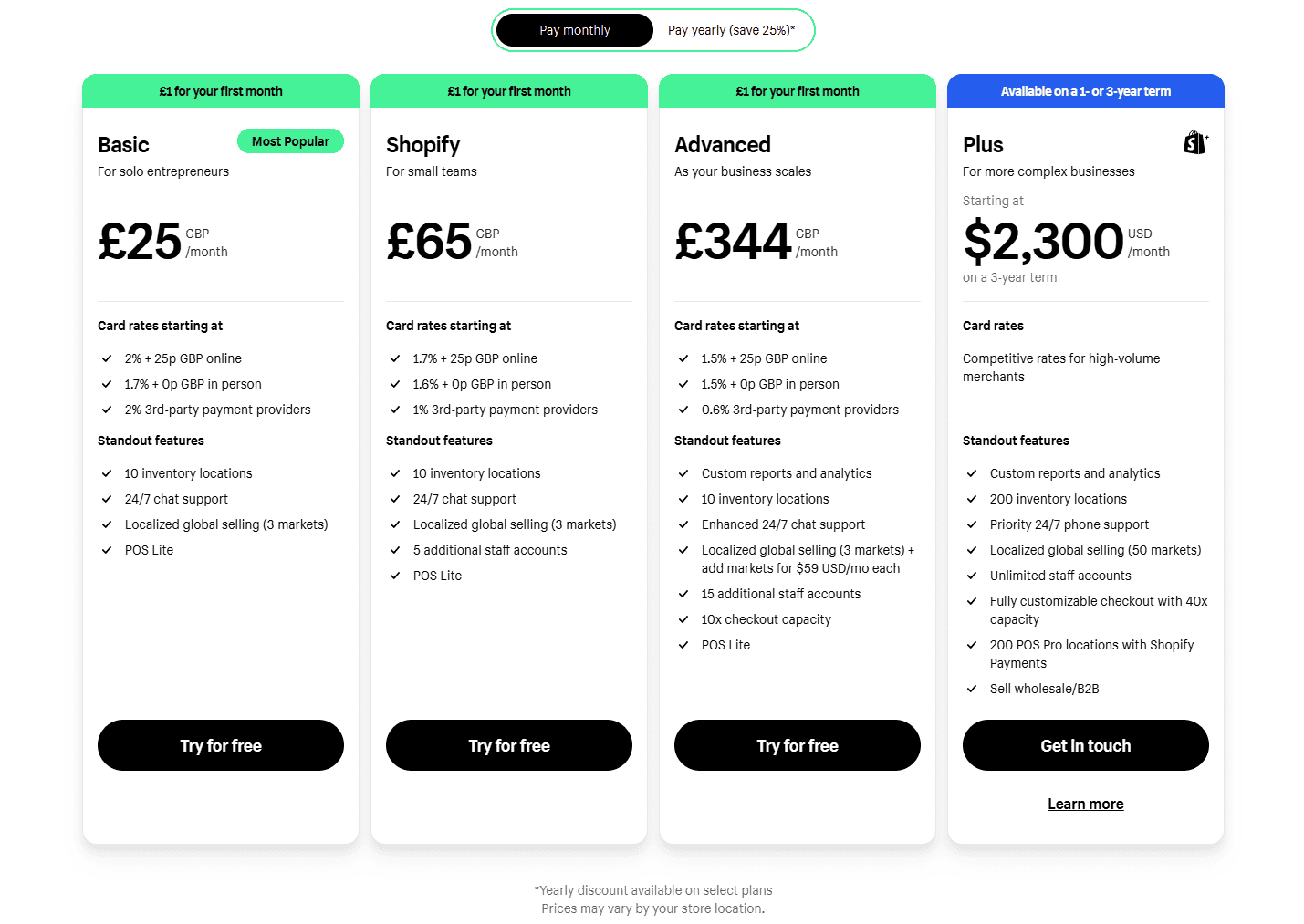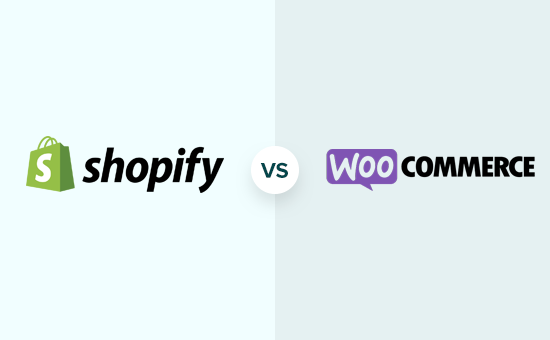Are you thinking of starting an online store? Not sure whether you should use Shopify or WooCommerce?
Shopify and WooCommerce are the two top e-commerce platforms globally, each with pros and cons.
This guide will show you a detailed comparison of Shopify vs. WooCommerce. The goal is to break down their advantages and disadvantages to help you choose the best option for your e-commerce store
What is Shopify?
Shopify is an all-in-one eCommerce solution that makes it easy to create an online store, accept payments, and manage your inventory, all from a single platform.
With Shopify, you don’t need to worry about the technical aspects of managing an eCommerce site, such as web hosting, security, caching, etc.
What is WooCommerce?
WooCommerce is an open-source e-commerce plugin built for WordPress. It allows you to leverage the most powerful content management system (CMS) and use it to run an online store.
WordPress is the most popular website builder on the planet, powering 43% of all websites. Many don’t know that WooCommerce is the most popular e-commerce platform (yes, even more popular than Shopify), with 6.6 million users.
Because of the open-source nature of WooCommerce, you can customize every aspect of your store and easily add custom extensions, plugins and integrations.
Scalability
With scalability in mind, it is good to know that both platforms are very scalable and are used by many of the world’s largest organisations as the powerhouse of their sales.
WooCommerce is a self-hosted platform, which makes you or your agency responsible for maintaining updates, backups, and security of your website. Once your business starts rapidly growing and with increased traffic to your site, this may require increasing your hosting plan or looking to other technologies to handle more traffic. Since WooCommerce is self-hosted, this means you will have full flexibility in controlling the traffic on your site.
Shopify handles the technical parts of your store at a smaller scale, which means you don’t have to worry about performance, security, and scalability. Once your business starts growing rapidly, you can simply upgrade your Shopify plan or with large amounts of traffic, you will need to reach out to Shopify to discuss enterprise plans and hosting.
For fulfilment, stock control and use with a warehouse, both platforms can integrate with software such as ShipStation to handle fulfilment, orders and warehousing control. Some users may prefer using such software straight away for an easier fulfilment process.
Customisability
WooCommerce‘s Open-source nature means that it is extremely customisable and you can have complete control over the look, feel and design of your website. This combined with the enormous library of integrations and third-party design apps of WordPress, means that there are really no limits to how to can design your site to make it perfectly reflect your business and branding.
Plugins and tools such as Elementor & ACF give you the ultimate flexibility in displaying your products and page designs dynamically across your site.
Shopify‘s out-of-the-box customisability is very limited compared to WooCommerce. You can use the Shopify tools to create a site fairly easily. But having control over dynamic fields, positioning and custom layout is more difficult. There are tools such as Shogun and Pagefly that can help create a more customisable experience with no code and a drag-and-drop type experience. But they are not ideal for more robust Shopify solutions.
Shopify can be quite customisable but would require custom coding, designing and probably a team to maintain and edit this.
Security
Security should be a concern for any business owner or website manager. With 46% of businesses and charities experiencing a cyberattack in 2019 at an average cost of £8,170, security must become a priority for every business with an online presence.
WooCommerce sometimes gets a rep of being not very secure, but usually, these types of security breaches only happen when the site is not maintained properly or is using unknown plugins and integrations. When maintained properly, WooCommerce (built on WordPress) is an extremely secure platform that can be strengthened even more by using Third-Party security software such as SolidWP or Wordfence
Shopify is an all-in-one platform. So naturally this means that it is less prone to security threats and exploits. Keeping common security practices is still very important though and limiting access to trusted users is very important to ensure the security of your site.
Cost
Shopify has a Basic plan that starts at £25 per month, and you can upgrade to the Shopify plan for £65, the advanced Shopify plan for £344 per month and the plus/enterprise plan which starts at £2300 per month for businesses that have a lot of website traffic.
If you have your own domain then you will have to purchase that and connect it separately. However, a domain is usually around £14 a year.
Transactions depend on which plan you choose. This can be seen in the image below:

WooCommerce is technically free to use. It is a plugin for the WordPress platform that is free to add and use. However, you’ll need a domain name, SSL certificate, and a WordPress hosting account to start a WooCommerce store.
Hosting will be your main cost for a WooCommerce site. The cost of your hosting will vary a lot depending on your requirements but from companies such as Hostinger, Siteground and Kinsta, you can get some decent hosting for around £15 a month that includes an SSL certificate. Your hosting can also be upgraded over time as you grow and need more demand.
With a WordPress account, you may also have to take into account any premium features, themes or plugins that would like to use.
An example of this would be Elementor whose premium plans start at around £32 per year.
Alternatively, you can connect with an agency like Virtuweb and have your site fully hosted maintained and updated to ensure good performance. Working with an agency like us usually means you will get discounts for premium plugins like Elementor.
Performance
Performance is without question a very important factor for your website and ensuring that your customers have a nice and smooth experience when shopping in your store.
With a WooCommerce website, there are lots of factors that will determine your website’s speed but the most important one is your hosting. With WordPress, you are not locked into one specific host, you can choose between hundreds of different hosting providers that all provide different speeds at different price points.
A WooCommerce website also lets you implement other website speed technologies such as web caching and a CDN. With all of these different factors taken into account and with a properly designed website, you can achieve lightning-quick website speeds.
Shopify is known to be a little more limited in performance for most users. You can of course build a more custom Shopify infrastructure but this only applies to businesses that have a large budget and team.
The reason Shopify is a little more limited here is due to the lack of options for hosting the website. By design, all of Shopify’s stores with their packages are hosted with Shopify directly. So there are no other options for faster hosting providers or the ability to implement technologies such as caching and CDNs yourself externally.
The winner in the performance category currently goes to WooCommerce due to their flexibility, technology and options that help speed up your website.
Conclusion
The right platform for your website ultimately is down to you and your priorities. But in general, If you value being able to fully customise the design of your website and have fast performance, then a WooCommerce website is probably the better option for you.
Alternatively, if you are just looking for the easiest tool to use and want to get up and running quickly, then Shopify will be a great platform for you.
If you would like to discuss your plans for a website then get in contact with the team and we can help you decide what is best for you and hopefully help you on your journey.

